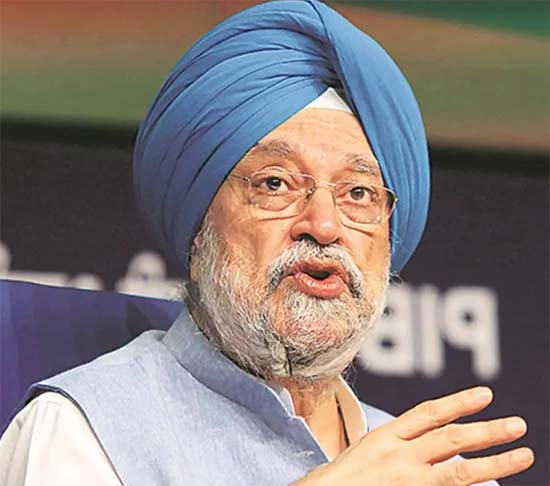New Delhi: “India is ready from the supply side to launch E20; this target was advanced by 5 years from 2030 under the ethanol production goal of 1000 crore litres to April 2023”, underlined Hardeep S. Puri, Union Minister of Petroleum & Natural Gas and Housing & Urban Affairs to the auto industry. However, he said that there is a need to massively upscale the production of flex-fuel engine vehicles in the country.
The Minister was addressing the gathering at the Plenary Session on “A giant leap for biofuels – Ethanol blending & SATAT Scheme” at SIAM’s International Conference on Biofuels – A Pathway Towards Sustainable Future. Several dignitaries including Mr Andre Aranha Correa Do Lago, Ambassador of Brazil to India and representatives from energy and auto industry were present at the event.
Further elaborating on the upscaling of flex-fuel engine vehicles in the country, Mr.Puri observed that more options need to be created at various price points, including 2-wheelers and 3-wheelers, and we need them quickly. He said that there are projected timelines for the roll-out of such flex-fuel E10 and E20-compatible vehicles, but there is a pressing need to advance those timelines.
The Minister assured the automobile manufacturers that as the world’s fastest-growing and most robust major economy, there will be guaranteed consumer demand for flex-fuel and E20-compatible vehicles. The Govt. of India, as has been reiterated, will provide comprehensive support from the supply, policy, and demand side for making the sale of flex-fuel E10 and E20 vehicles a viable business proposition for the auto industry, he said.
Noting the IEA forecast, Mr.Puri said that India will contribute a quarter of the growth in energy consumption in the coming two decades. BP estimates that India’s energy demand will grow by 2x, while its natural gas demand will grow by five times by 2050. Referring to the Prime Minister Narendra Modi’s ‘Panchamrit’ roadmap at COP 26 Glasgow, he said that India aspires to set an example by marrying economic development as the world’s fastest-growing major economy and clean energy transition as one of the world’s fastest-growing energy consumers.
He said that Government of India under leadership of Prime Minister Narendra Modi has realised the game-changing opportunity for achieving economic growth, especially for the farming and rural economy, increasing India’s domestic energy production and self-sufficiency, reducing air pollution, and helping India lead the world toward a clean energy transition.
In this background, National Biofuel Policy was enacted in 2018 to promote the production and consumption of Biofuels. Ethanol-blending percentage in petrol rose sharply from 0.67% in 2013 to 10% in May 2022, i.e., 5 months ahead of schedule, informed Shri Hardeep S. Puri.
The Minister further added that the policy has translated into a reduction of 2.7 million tonnes of CO2 emissions and savings of more than Rs. 50,000 crores of foreign exchange. Achieving E20 blending with petrol by 2025 would help save foreign exchange for the country worth about Rs. 30000 crores per annum. He further informed that the number of petrol pumps selling Biofuels has increased three folds from 29897 in 2016-17 to 67641 in 2021-22. India’s ethanol demand is poised to grow to 10.16 billion litres by 2025.
During the event, Mr.Puri further elaborated upon the efforts of Government to promote production of biofuels in the country. He mentioned about the twelve commercial plants and ten demonstration plants of 2G biorefineries (using agricultural waste as substrate) that have been proposed to be built under the Pradhan Mantri JI-VAN (Jaiv Indhan-Vatavaran Anukool Fasal Awashesh Nivaran) Yojana in regions with adequate biomass supply. He also spoke about Asia’s 2G ethanol biorefinery, which was unveiled by Prime Minister in Panipat, Haryana in August, 2022.
India is also launching a Global Alliance on Biofuels, along with USA and Brazil, during India’s Presidency of G20, the Minister said.
The Minister also talked about the support provided by Government to Bio-energy technologies such as CBG with initiatives such as SATAT, under which 37 CBG plants have been commissioned, and approximately 9000 tonnes of Compressed Bio-Gas have been sold.
Mr.Puri highlighted that the forex saved by the government by substituting imported petroleum fuel with Biofuel and natural gas with CBG is being used to subsidise other low-carbon mobility technologies, such as EVs, forming a self-reinforcing loop of the clean energy transition. So far, 4003 EV Charging Stations and 72 Battery Swapping Stations have been put up by OMCs across the country. OMCs have also planned to set up 20000 EVCS in major cities and Highways across the country by 2024, he informed.
The Minister called upon the Indian automakers that they must continue on the path of sustainability in order to make decarbonised mobility a reality. The nimble shift witnessed during Bharat Stage VI adoption needs to be replicated for the biofuel adoption initiatives.
In his concluding remarks, Mr.Puri assured support to the auto industry from India’s leading OMCs and refineries, whose combined marketing, refining, and R&D capabilities can accelerate the synergies.


